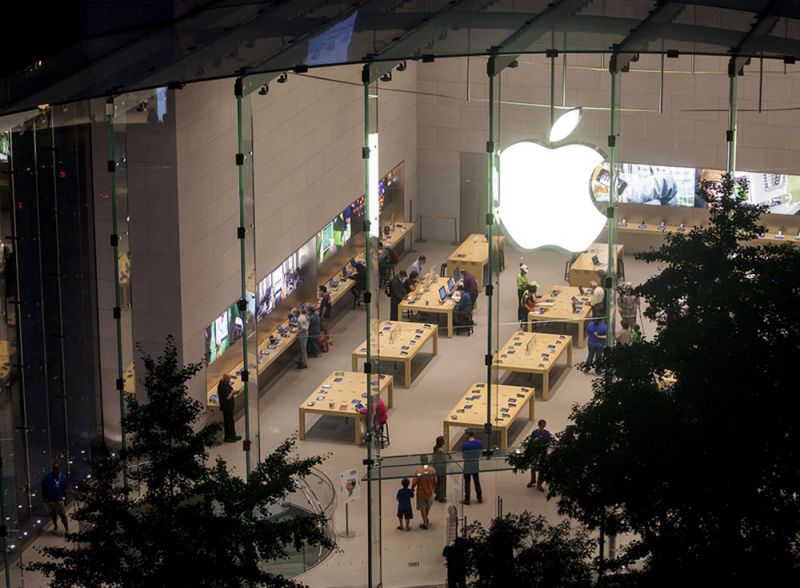(Bloomberg) — Apple Inc.’s China-centric manufacturing base is at risk of disruption after the Lunar New Year holiday as the company’s partners confront the coronavirus outbreak that has gripped the country and caused more than 100 deaths.
Virtually all of the world’s iPhones are made in China, primarily by Foxconn’s Hon Hai Precision Industry Co. at its so-called iPhone City in Zhengzhou and by Pegatron Corp. at an assembly site near Shanghai. Each of those locations is more than 500 kilometers away from Wuhan in central China, the epicenter of the viral outbreak, but that distance doesn’t immunize them from its effects.
“I can’t imagine a scenario where the supply chain isn’t disrupted,” said veteran industry analyst Patrick Moorhead of Moor Insights & Strategy. “If there’s one major hiccup in the raw materials, fabrication, assembly, test, and shipping, it will be a disruption.”
Apple has been increasing production to meet higher-than-anticipated iPhone demand, Bloomberg News reported last week. The company typically launches its new high-end iPhones around September, so the virus is unlikely to have meaningful impact on those plans, however the company is also preparing to begin mass production of a new low-cost iPhone in February, which is more at risk.
Apple has roughly 10,000 direct employees in China, across its retail and corporate entities. Its supply chain also has a few million workers manufacturing products like the iPad, iPhone and Apple Watch. Many of those employees have been home the past few days for the holiday, and the company hasn’t said if it is asking them to stay home for longer to prevent the virus spreading. Chinese authorities have imposed severe travel restrictions and taken the drastic step of quarantining the entire city of Wuhan, a population of more than 11 million.
“Supply chain disruption is a worry if employees across Foxconn and other component manufacturing hubs in China are restricted,” said analyst Dan Ives of Wedbush Securities Inc. “If the China outbreak becomes more spread it could negatively impact the supply chain which would be a major investor worry.”
An Apple spokeswoman declined a request for comment.
Foxconn said it is monitoring the situation in China and following all recommended health practices. It declined to comment on production in specific locations but said, “We can confirm that we have measures in place to ensure that we can continue to meet all global manufacturing obligations.”
Confirmed cases of the coronavirus are rising in Henan province — home to Zhengzhou facility — which may lead Hon Hai or the government to close factories to prevent further contamination, Bloomberg Intelligence analyst Matthew Kanterman wrote. The province accounted for a quarter of China’s smartphone exports last year, while China’s exports make up 27% of global smartphone sales, he said, citing government and IDC data. Foxconn is estimated to account for more than 60% of Henan’s total trade.
The Cupertino, California-based company prepares for extreme scenarios such as the coronavirus by mandating that major components be dual-sourced — both in terms of vendors and geography — and a major immediate impact to its production plans is unlikely for now, according to a person familiar with its operations. Even so, the vast majority of its assembly work is done in China, and so a shortage of workers for assembly lines will have a direct impact on shipment numbers.
Apple put the redundancy policy in place after the 2011 earthquake and tsunami that hit Japan and led to component constraints for the iPad 2 that the company launched that year.
While Apple doesn’t have any stores in Wuhan, it does have dozens of retail locations across the Chinese mainland. The company hasn’t announced any closures yet, however it has shortened the opening hours of several stores in the country through Feb. 7, according to a review of its retail website. That shift could be due to the Chinese government extending the lunar holiday as a means to control the virus.
Along with its local workforce, Apple also relies on many of its U.S. staff going back and forth across the Pacific Ocean, with United Airlines Inc. last year revealing the company was spending $35 million per year flying employees between San Francisco and Shanghai alone. That included 50 daily business-class seats, according to the airline. How the virus outbreak may affect the research and development efforts that those trips facilitate has yet to be established.
Investors and analysts will be looking to Chief Executive Officer Tim Cook to make comments on the virus and its impact on Apple during Tuesday’s conference call to discuss the latest quarterly financial results. Cook tweeted over the weekend that Apple “will be donating to groups on the ground helping support all of those affected” by the virus.
To contact the reporters on this story: Mark Gurman in Los Angeles at [email protected];Debby Wu in Taipei at [email protected]
To contact the editors responsible for this story: Peter Elstrom at [email protected], Vlad Savov
<p class="canvas-atom canvas-text Mb(1.0em) Mb(0)–sm Mt(0.8em)–sm" type="text" content="For more articles like this, please visit us at bloomberg.com” data-reactid=”60″>For more articles like this, please visit us at bloomberg.com
<p class="canvas-atom canvas-text Mb(1.0em) Mb(0)–sm Mt(0.8em)–sm" type="text" content="Subscribe now to stay ahead with the most trusted business news source.” data-reactid=”61″>Subscribe now to stay ahead with the most trusted business news source.
©2020 Bloomberg L.P.













